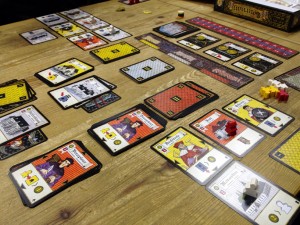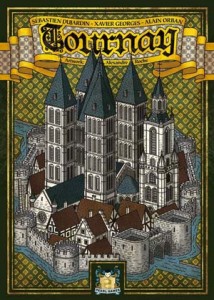Review: Tournay
Posted by James (admin) on November 8th, 2011
 Tournay is a card-based game where players aim to score the most prestige points (PPs) by building their own town. It’s by the same designers as Troyes (which was why I pre-ordered a copy) but, whilst it uses the same art style as Troyes and a couple of similar-ish elements, Tournay is very different to Troyes and not the card game version of it at all.
Tournay is a card-based game where players aim to score the most prestige points (PPs) by building their own town. It’s by the same designers as Troyes (which was why I pre-ordered a copy) but, whilst it uses the same art style as Troyes and a couple of similar-ish elements, Tournay is very different to Troyes and not the card game version of it at all.
In the middle of the table are 9 decks of cards – levels 1, 2 & 3 in colours red, white and yellow. The cards are buildings and characters – buildings can be activated to use their abilities; whereas, characters have effects when buildings are placed or triggered in the same row/column as the character card. For example a character card may earn a player cash when they activate a white building. Whilst you can build over placed cards, as your town can only be 3×3 in size, it is plain from the start that you need to find a good balance between buildings and characters and place them so they have synergy.
On a turn, a player can choose to place a card from their hand into their town (paying any costs). Then, a player must take an action. Most actions require using citizens – each player starts with 2 citizens of each colour (red, white & yellow) but they can also use other players’ citizens if they pay 2 coins for each one to the owning player. When used, citizens are laid down next to the owning players plaza card (or placed on the player’s town cards).
Possible actions are:
Activate a Building: Place a citizen that matches the building’s colour onto your building. (If a player uses another player’s citizens for this, the citizen still belongs to the owner.)
Draw a Card: Use a number of citizens (all the same colour as the card) equal to the level of the card. Either take 2 face-down cards and place the unchosen card face-up on the deck, or take the face-up card.
Gain Cash: Use citizens of the same colour to gain 2 cash for each.
Fight an Event: See below
Gather Citizens: Place all your citizens back onto your plaza ready for further use.
Event cards are an interesting game mechanic. There are always 3 event cards in play. Each of the 9 card decks contains a town crier card and, when one of these is drawn, all of the events take place (plus some players can trigger the events with their buildings too). Events usually have negative effects (using citizens, losing money, etc.) but some actually earn cash for the players with most resources. Each time they are triggered, their effects increase too. As an action (and sometimes by activating buildings), a player can choose to defeat an event at a cost (which often increases when it is more powerful). Whilst removing an event may benefit other players too, you get to remove the one that most annoys you (or benefits an opponent); however, you also get to keep the event card and use its other side which allows you to ignore the effects of a single event once later in the game (and is worth 1PP too).
The game end is triggered when 2 players have filled their 3×3 city including two level 3 cards (prestige buildings), or one player has done this and 5+ town criers have occurred. Players only score PPs at the end of the game. Players earn PPs for the cards in their town; however, most points are scored from the prestige buildings (level 3 cards). Prestige buildings say how PPs are earned (e.g. PPs for having white cards in your town, for each full set of coloured citizens, etc.); however, apart from one card, all players can earn these PPs but the prestige building’s owner earns more than those who do not own the prestige building.
 Overall, I really enjoyed Tournay. It required some thinking to get things flowing in the right order – having ready citizens, having enough cash, placing character cards in locations and order that worked with your buildings, etc. It was a bit confusing to start with as we learned what capabilities buildings and characters could have and what worked well together too.
Overall, I really enjoyed Tournay. It required some thinking to get things flowing in the right order – having ready citizens, having enough cash, placing character cards in locations and order that worked with your buildings, etc. It was a bit confusing to start with as we learned what capabilities buildings and characters could have and what worked well together too.
Even though the first game was fun to play, I am expecting the next games to be even better because of knowing how the game mechanics work and fit together (like Troyes). I don’t usually like spending a game just learning it so I can play properly the next time, but Tournay is still very playable first time (although experienced players are likely to beat new players if mixed in the same game).
Turns are very short and simple so downtime is minimal and you always feel like you’re involved. Player interaction is medium – the building race feels very competitive; however, there aren’t many ways to directly effect other players and using each other’s citizens can upset players’ plans, but these are not huge effects. I didn’t find this an issue (especially as someone affecting you directly could really mess up your carefully balanced plan) but player interaction can be increased by using the expansion cards that come with the game.
It’s important to work out how to combine cards in your town so they work well together. However, you need to keep in mind that you want to earn PPs so you want to find the prestige buildings that maximise your points. Also, you can try to react to the prestige cards other players have played so you can maximise your ways to earn extra PPs.
I’m not great at planning long-term strategy and I liked how Tournay allowed me to create shorter plans to execute and then re-group after that to work out what to do next. You definitely need to plan short- to medium-term though in order to get the cash, citizens and card types to gel together and pay out their benefits.
Events can really affect you when they increase in their effect and can even get out of hand too, especially if another player triggers them on purpose (rather than their occurrence just being left to the town crier cards). Then again, the positive ones can really benefit you a lot if they have many coins on them and you’re the one reaping the reward.
The rules are only four pages long which is good but the summary card which explains the various icons on the cards is not the greatest and has a couple of errors too. The icons on the cards are actually well-designed as they need to explain a great deal, but it does take a bit of time to decipher what they mean to start with. The graphical style is quite stark and very gothic, which I don’t mind, but it could put some players off which would be a shame.
Tournay is a game with lots of interesting decisions, tight resources and feels different to other games. Tournay finished number 1 on the player-voted Fairplay list at Spiel in Essen and I can see why it appealed to so many gamers.
James.
[Played with 4 players]
Interested in Troyes too? Read the review.

